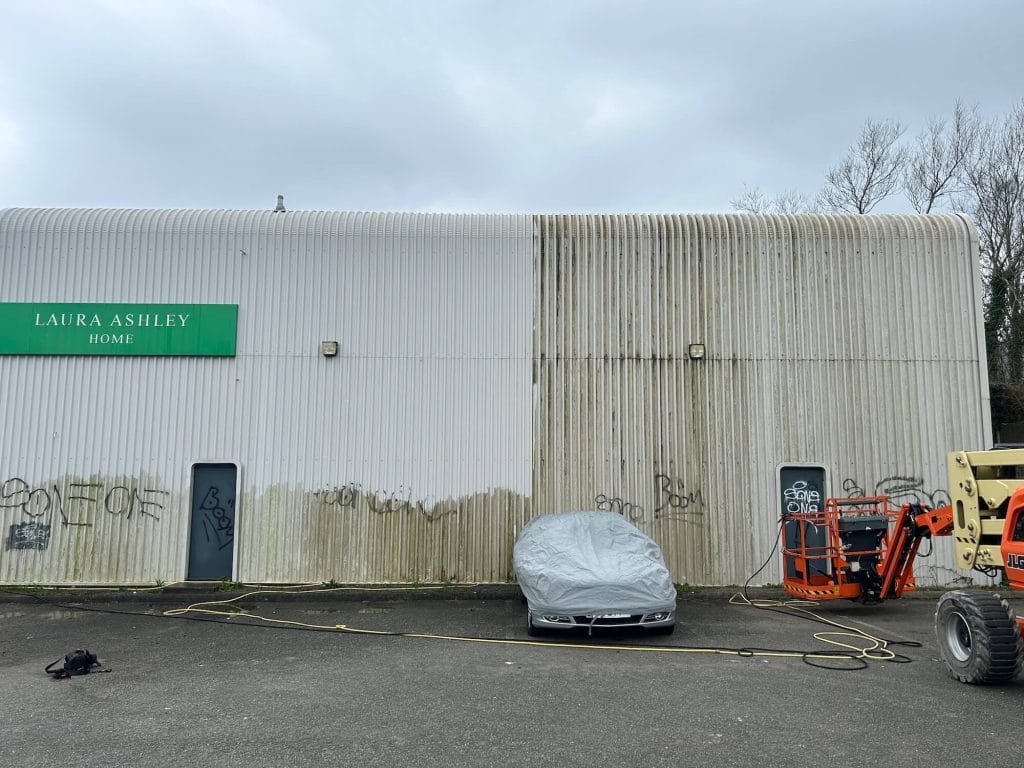Commercial cladding plays a vital role in protecting buildings from the elements while improving their visual appeal. Whether made from aluminium, steel, composite, timber, or uPVC, cladding can make a strong first impression, but only if it’s clean and well-maintained. Over time, exposure to pollution, algae, moss, and weathering can cause cladding to look tired, discoloured, and even start to deteriorate.
This guide will walk you through the key methods used in professional cladding cleaning, the benefits of regular maintenance, and best practices to ensure your building looks its best and remains protected for years to come.

Why Commercial Cladding Cleaning Matters
Clean cladding isn’t just about appearances. It can help maintain the structural integrity of your building, prevent costly repairs, and ensure compliance with lease agreements or health and safety standards. Dirty cladding can trap moisture, encourage organic growth, and accelerate corrosion or material breakdown, reducing the lifespan of your investment.
Regular cleaning also boosts your company’s image. For businesses, a well-kept exterior sends the right message to clients, visitors, and employees, showing attention to detail and pride in your premises.
Common Types of Commercial Cladding
Understanding the material your cladding is made from is essential, as it determines the best cleaning method. Common types include:
- Metal cladding – Often made from aluminium or steel with powder-coated or painted finishes.
- Composite cladding – A mix of materials designed for durability and low maintenance.
- uPVC cladding – Lightweight and weather-resistant, but prone to staining over time.
- Timber cladding – Requires specialist care to avoid damage and maintain its finish.
Different materials require different cleaning techniques to avoid scratching, fading, or structural damage.
Professional Cladding Cleaning Methods
Soft Washing
Soft washing uses low-pressure water combined with specialist cleaning solutions to gently remove algae, moss, dirt, and pollutants without damaging the surface. It’s particularly effective for painted or powder-coated finishes, where high pressure could strip or chip the coating.
Pressure Washing
High-pressure washing can be used for robust cladding materials like certain metals or concrete panels. It’s effective for removing stubborn dirt and debris, but should only be carried out by trained professionals to avoid surface damage or water ingress.
Chemical Cleaning
Specially formulated cleaning agents can break down specific contaminants such as traffic film, grease, or rust stains. Professionals select the right solution for the cladding type, ensuring safe and effective results.
Steam Cleaning
Using superheated water vapour, steam cleaning is ideal for delicate surfaces and heritage buildings where abrasive methods are unsuitable. It removes dirt and organic matter while killing spores to prevent regrowth.
The Benefits of Regular Commercial Cladding Cleaning
A well-planned cladding cleaning schedule offers several advantages beyond just aesthetics.
Improved Curb Appeal
A clean exterior creates a positive first impression, which is especially important for retail spaces, offices, and public-facing businesses.
Extended Lifespan
Removing contaminants such as moss, algae, and pollutants prevents damage, corrosion, and staining, helping cladding last longer.
Cost Savings
Routine maintenance reduces the need for major repairs or replacements, saving money in the long run.
Health & Safety Compliance
Regular cleaning helps prevent slippery surfaces on ledges or walkways caused by algae and moss, supporting workplace safety.
Lease Agreement Requirements
Many commercial leases include clauses requiring the tenant to maintain the building exterior to a certain standard.
Best Practices for Commercial Cladding Cleaning
Schedule Regular Inspections
Checking your cladding every six to twelve months can help identify issues early, such as algae growth or surface damage.
Use Trained Professionals
Specialist teams like Servos have the expertise, equipment, and accreditations to clean cladding safely, especially at height.
Choose the Right Cleaning Method
Matching the method to the material ensures a thorough clean without risking damage.
Plan Around Your Operations
Professional cleaning can be scheduled outside of business hours or in stages to minimise disruption.
Consider Protective Coatings
After cleaning, protective treatments can help resist future staining and slow down the build-up of dirt.
Why Choose Servos for Commercial Cladding Cleaning in North Wales and Beyond
With over a decade of experience, Servos Exterior Cleaning has worked on projects across a range of industries, from retail parks and office complexes to warehouses and industrial units. Our team is trained in working at height, IPAF certified, and fully insured, ensuring every job is carried out to the highest safety and quality standards.
We tailor each project to the specific cladding material, level of soiling, and client requirements, delivering long-lasting results that enhance both appearance and protection.
Ready to restore your commercial cladding?
Call Servos Exterior Cleaning today on 01745 289055 or email clean@servos.co.uk to book your professional cladding cleaning service and keep your building looking its best.

